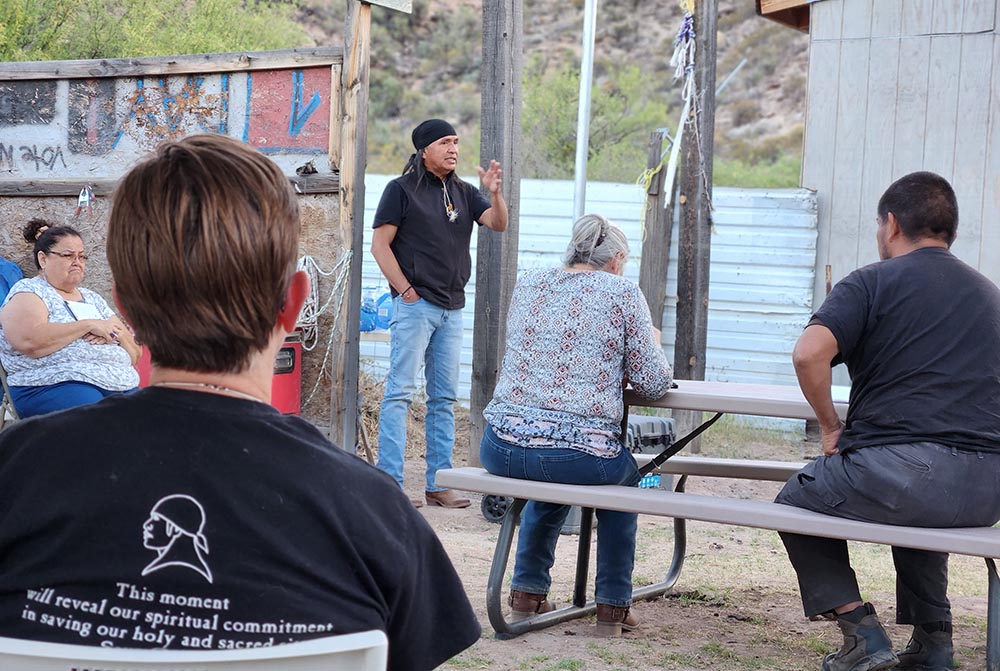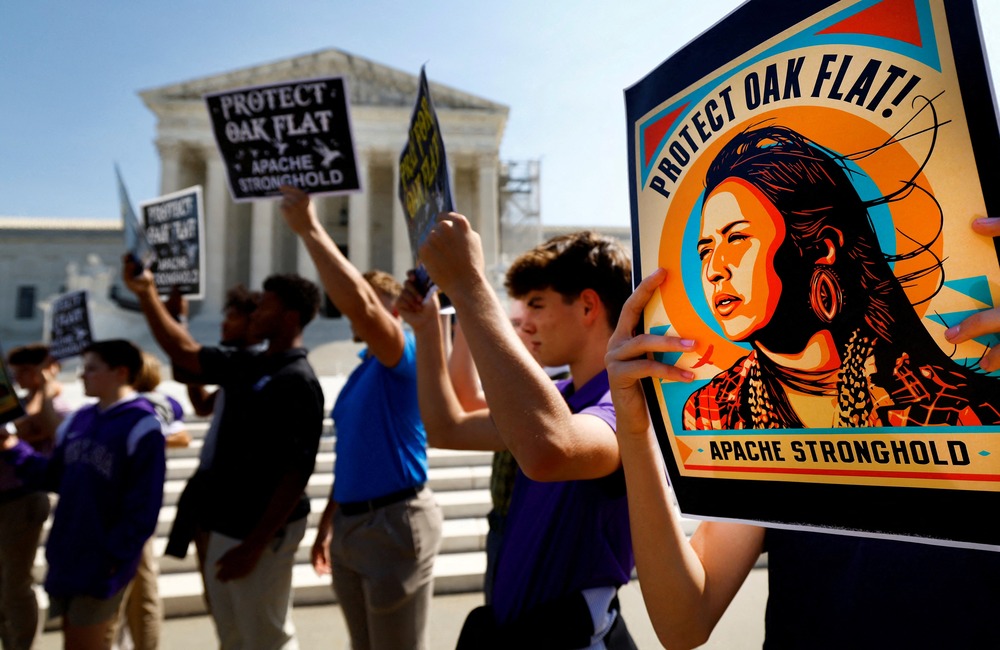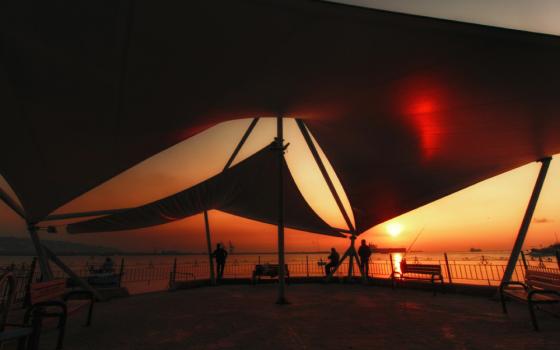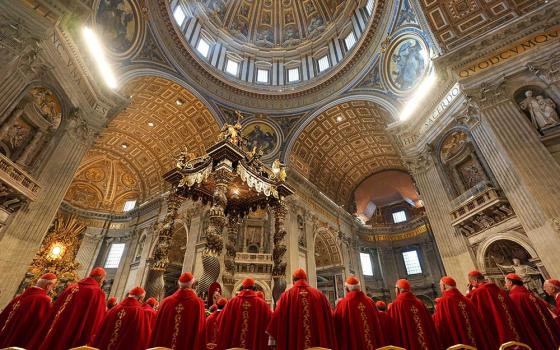
Oak Flat, known as Chi'chil Biłdagoteel among the Apaches, has been at the center of a land struggle for nearly two decades. A campground since the 1950s, the 6.7-acre area in southeastern Arizona has been a sacred space for 1,500 years for Apache and other Native tribes, who view it as a direct corridor to the Creator. (NCR photo/Brian Roewe)
A coalition of Western Apaches and allies, backed by Catholic and other religious groups, have again requested court intervention to halt a federal land transfer that would turn over Oak Flat, a centuries-old sacred site for Native Americans here in southeastern Arizona, to a foreign mining company.
The renewed pursuit of legal relief by Apache Stronghold, while a separate appeal remains before the U.S. Supreme Court, came after the Trump administration last week provided the required 60-day notice on plans to publish a final environmental impact statement for the proposed copper mine. Publishing that report sets in motion the transfer of 2,400 acres, including Oak Flat, to Resolution Copper within months.
Construction of the copper mine would leave a crater nearly 2 miles long and up to 1,100 feet deep, and with it wiping out Oak Flat — a 6.7-acre parcel of land where Apache and other Native tribes have gathered to pray and perform religious ceremonies for more than 1,500 years.
The two-decade long struggle over Oak Flat, what the Apache call Chi'chil Biłdagoteel, has drawn scores of religious supporters to Apache Stronghold's cause in recent years, including the U.S. Catholic bishops, Pax Christi and the Knights of Columbus, as religious liberty scholars view the case as potentially precedent-setting for future government-religion interactions.
Advertisement
Lawyers for Apache Stronghold have argued Oak Flat's destruction would violate the Apache people's rights to worship under the Religious Freedom Restoration Act. The 1993 law prohibits the government from substantially burdening a person's religious practice established under the First Amendment.
According to the environmental impact statement, compiled by the U.S. Forest Service, impacts from the planned copper mining on tribal sacred sites, as well as cultural and biological resources, "would be immediate, permanent, and large in scale."
"If Oak Flat is destroyed, religious practices at Oak Flat that date back at least a millennium are gone forever — and with them, the bedrock of Western Apache religious identity," the motion states.
Wendsler Nosie Sr., leader of Apache Stronghold and past chairman of the San Carlos Apache Tribe, in a press release called Oak Flat "our spiritual lifeblood — the sacred place where generations of Apache have connected with our Creator." Its loss, the coalition says, would make it impossible for Apache and other Native tribes to pray and perform rituals in a holy space they compare to Mount Sinai or St. Peter's Basilica.
"We are asking the courts to protect Oak Flat just as they have protected the sacred places of other faiths across the country," Nosie said.

Wendsler Nosie Sr., addresses a meeting of Apache Stronghold on the San Carlos Reservation April 24. (NCR photo/Brian Roewe)
Attorneys for Apache Stronghold filed the new emergency injunction in U.S. district court in Phoenix. A hearing is scheduled for May 7.
Luke Goodrich, vice president and senior counsel at the Becket Fund for Religious Liberty, which is representing Apache Stronghold, accused the Trump administration of "barreling ahead" with the land transfer while the Supreme Court decides if it will hear the case that was brought forward last fall.
"We're asking the courts to stop this move in its tracks and ensure justice can be delivered before Oak Flat is permanently destroyed," Goodrich said in the press release.
Resolution Copper, a subsidiary of Australia-based mining conglomerates Rio Tinto and BHP, has estimated the project will produce annually up to 40 billion pounds of copper — an element used in cell phones and electric vehicles — and create 3,000 jobs. The company has pledged to minimize adverse impacts on Native and culturally sensitive areas from mining activities.
Tyson Nansel, spokesman for Resolution Copper, in an email said the company has consulted for nearly a decade on the project and will continue to engage groups, including Native American tribes, over concerns. "The Oak Flat campground will remain open and accessible for decades," Nansel said.
For more than two decades, members of the San Carlos Apache Tribe have sought to preserve Oak Flat. For 1,500 years, Apache have gone to the site — 70 miles east of Phoenix on the edge of the Tonto National Forest — to pray, gather traditional acorns and medicinal plants, and hold sacred rituals like sweat lodge ceremonies for young men and Sunrise Ceremonies for young women.
The Apaches view Oak Flat as a direct corridor to the Creator, and a dwelling place of Ga'an, or spiritual beings. It is home to burial grounds and culturally significant old-growth Emory oak groves.
"We are asking the courts to protect Oak Flat just as they have protected the sacred places of other faiths across the country."
— Wendsler Nosie Sr.
Today, a campground rests atop the Oak Flat site, while underneath is one of the largest untapped copper deposits in the world. Resolution Copper has sought the land since 2004. After a dozen bills failed to pass in Congress, Arizona senators John McCain and Jeff Flake attached the land transfer to a must-pass defense bill in 2014, which was signed into law.
Near the end of his first term, in January 2021, President Donald Trump sought to fast-track the Oak Flat land transfer. That March, the Biden administration rescinded the environmental impact statement, a move that federal courts have cited previously in denying an injunction by saying there was no imminent harm with the land transfer paused.
Now with a potential transfer just two months away, Apache Stronghold says the threat of Oak Flat's total destruction is greater than ever before.
"We know this place, we know this land, and we know what's at stake," Nosie said in an interview on the San Carlos Apache reservation the day of the new injunction filing.
Along with posing a threat to their religious practices, Apache Stronghold and its allies have argued copper mining will threaten the local ecosystem and water systems. The San Carlos Apache Tribe and environmental groups have filed separate lawsuits on those grounds.
Since receiving Apache Stronghold's petition in September, the Supreme Court has listed the case for consideration 12 times, a sign the justices are actively considering the case, its lawyers said in the new motion. The next date for the court to consider the case is Friday (May 2), with a possible decision Monday (May 5).

Members of the Native American coalition Apache Stronghold hold protest cards ahead of formally asking the Supreme Court to overturn an earlier ruling allowing the development of the Resolution Copper mine in Oak Flat, Ariz., outside the court in Washington Sept. 11, 2024. (OSV News/Piroschka van de Wouw, Reuters)
The legal process has attracted a wide gamut of supporters to Apache Stronghold, including from 44 tribal nations and religious organizations. Among Catholic supporters are conservative Catholic legal scholars, the U.S. Conference of Catholic Bishops, the Knights of Columbus, Pax Christi USA, Franciscan Action Network and Ignatian Solidarity Network. Students at Brophy College Preparatory, a Jesuit school in Phoenix, have also been active supporters.
Becket, the law firm representing Apache Stronghold, has represented religious clients in some of the largest cases to reach the Supreme Court in recent years, including the 2014 Burwell v. Hobby Lobby decision on the government's contraception mandate and 2012's Hosanna-Tabor establishing a "ministerial exception" in religious hiring practices.
Nosie said the monthslong interregnum in the courts has allowed him personally to dive deeper in prayer, and for the broader coalition, a moment to unite and connect with the holiness they find at Oak Flat.
"Now there's a solid relationship," he said. "In this kind of battle we're in, we need loyalty to what the Creator had created for us."
Nosie asked that other faith traditions stand beside Native Americans in standing up in protecting Mother Earth and their sacred practices tied to the land, "the first, greatest gift God made."
"How can any other religion move forward knowing that the oldest religion here [in America] is not even protected from anything?" he said.







